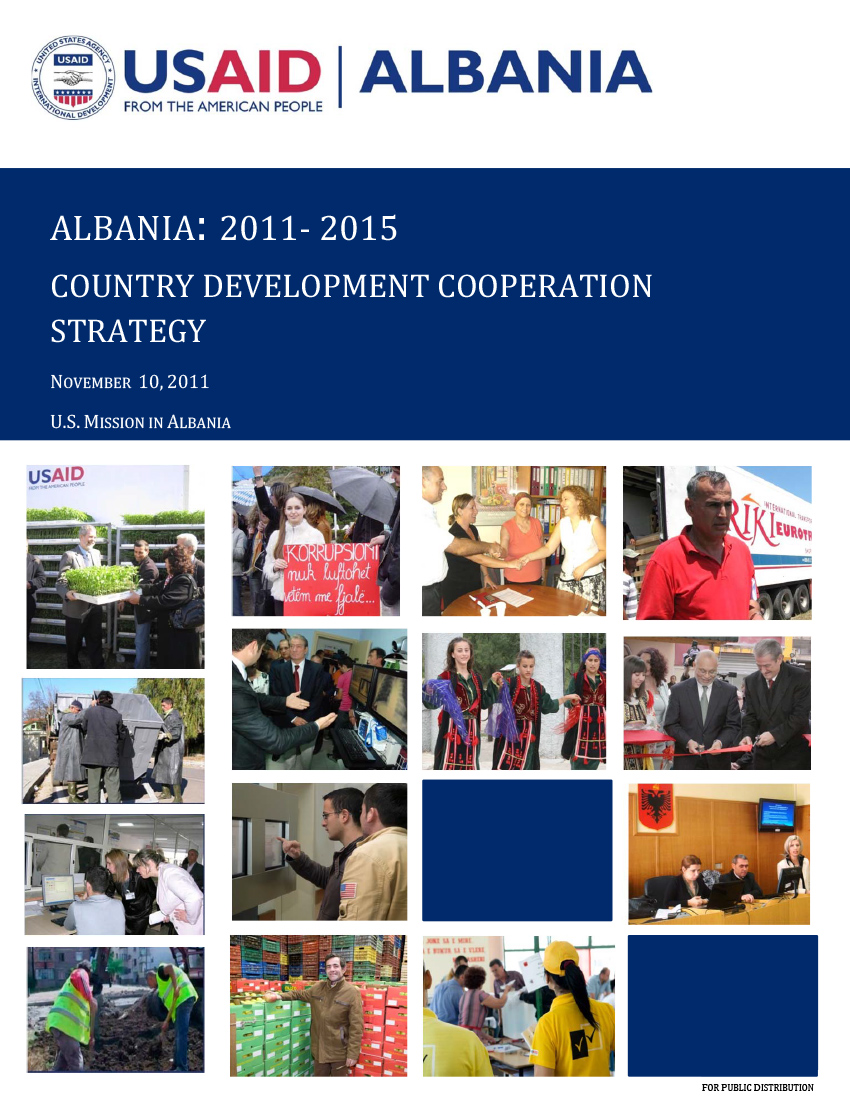Albania is a small but strategically important country where U.S. influence is exceptionally strong. In light of budget constraints and in the context of legacy planning, USAID/Albania has designed a strategy that will concentrate on leveraging U.S. influence at the policy reform level. The program focus for the next five years will be on working with the Government of Albania (GOA) and the private sector on results‐oriented transformational reforms and changes in the regulatory environment that will lead to strengthened democratic institutions and sustainable economic growth. This will better position Albania to achieve its European integration aspirations while, at the same time, advancing U.S. objectives related to Albania’s role in helping to move forward U.S. foreign policy priorities. The program will directly support the President’s U.S. assistance goals for Eastern Europe – as articulated most recently in the FY 2012 Foreign Assistance Budget for Europe and Central Asia – that call for integration into the Euro‐Atlantic community, promoting reforms and consolidating stability.
This strategy proposes an overarching goal of European integration through strengthened democratic institutions and inclusive economic growth. Two Development Objectives (DOs) will support this goal.
DO#1, strengthened rule of law and improved governance: This DO has been selected given the current state of nascent democratic institutions in the country and a pervasive culture of corruption that undermines economic growth and citizen confidence, and conflicts dramatically with EU standards of transparency, accountability, and decentralization of authorities. Interventions will be chosen that strengthen key institutions, promote civil society, and reduce corruption, with results radiating beyond democracy and governance into the private sector. Under this DO, there will be a strong focus on strengthening the relationship between the central and local governments in order to improve planning, create the framework for development of a national territorial plan, and assure more efficient and transparent delivery of key public services that touch the daily lives of all citizens, e.g., water, sewerage, energy, and education. Given the pervasive impact of the judiciary and health sectors on the lives of ordinary citizens and the “most corrupt” epitaph attached to them, focus will be squarely on improving the enabling environment for policy reform and planning, enhancing citizen oversight and transparency, and upgrading performance and management capabilities in the judiciary and health delivery arenas.
DO#2, conditions created for broad‐based, sustainable, and inclusive economic growth: This DO will focus on putting in place those reforms and regulations that will lead to a better business environment, more competitive micro‐, small‐ and medium‐sized enterprises (MSMEs), and a stronger financial sector. Improved dialogue between the GOA and the private sector will be encouraged through working with chambers and associations in order to identify and remove constraints to doing business. Effective use of public private partnerships (PPPs) will help to fill a serious resource gap in the country while addressing infrastructure (energy, roads, ports, etc.) and other constraints, for example in agro‐marketing. Carefully targeted technical assistance to the financial sector will further strengthen regulatory authorities.
In achieving this strategy, USAID will reduce its focus on clinical interventions in the health sector and with farm/firm level activities in the economic growth portfolio. The increased application of E‐Systems, so successfully applied in the MCC threshold program, will be a key tool in both DOs for promoting transparency and reducing corruption.
In articulating these DOs, the Mission assumed that the GOA has the political will to reduce corruption and create a vastly stronger economy. Given the ardent desire for EU integration, this is not an unreasonable assumption, but vested interests and power politics (viz the current standoff between political parties in the Albanian Parliament) could potentially play a negative role. The Mission believes this is a risk worth taking, in order to help assure a democratic and economically strong Albania, more able to meet the needs of its citizens and to play a stabilizing role in the Balkan region and beyond in support of U.S. policy objectives









Comment
Make a general inquiry or suggest an improvement.